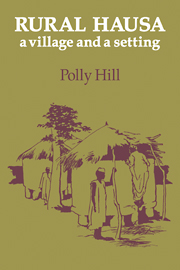Book contents
- Frontmatter
- Contents
- List of tables
- List of illustrations
- Preface
- List of abbreviations and conventions
- Map of Hausaland (after Morgan and Pugh, 1969)
- I Introduction
- II Batagarawa
- III Fathers and sons in gandu
- IV The evidence for economic inequality
- V Further aspects of inequality
- VI The sale of manured farmland
- VII Migration
- VIII Farm-labouring
- IX Local trade in grains and groundnuts
- X Individual poverty
- XI Individual viability
- XII Short-term stability
- XIII The absence of ‘class’
- XIV Concluding speculations
- Commentary, including Hausa glossary
- Bibliography
- Index
III - Fathers and sons in gandu
Published online by Cambridge University Press: 05 May 2010
- Frontmatter
- Contents
- List of tables
- List of illustrations
- Preface
- List of abbreviations and conventions
- Map of Hausaland (after Morgan and Pugh, 1969)
- I Introduction
- II Batagarawa
- III Fathers and sons in gandu
- IV The evidence for economic inequality
- V Further aspects of inequality
- VI The sale of manured farmland
- VII Migration
- VIII Farm-labouring
- IX Local trade in grains and groundnuts
- X Individual poverty
- XI Individual viability
- XII Short-term stability
- XIII The absence of ‘class’
- XIV Concluding speculations
- Commentary, including Hausa glossary
- Bibliography
- Index
Summary
The Hausa institution of paternal gandu is a voluntary, mutually advantageous, agreement between father and married son, under which the son works in a subordinate capacity on his father's farms in return for a great variety of benefits including a share of the food supplies. Nowadays in Batagarawa the gandu group usually, though not invariably, dissolves within a year or two of the father's death, when each son appropriates a portion of the gandu farmland and sets up as an independent farmer.
Starting with a general historical introduction, this chapter deals mainly with paternal gandu in Batagarawa. It lists the numerous rights and obligations which reciprocally link fathers and sons and considers the extent to which actual practices deviate from stated norms. It is concerned with the incidence of gandu and the circumstances in which sons leave gandu. It presents material relating to the ‘private farming’ of sons-in-gandu. It examines the fragility of fraternal gandu. But consideration of many wider related issues is postponed until later chapters.
The word ‘gandu’
The word ‘gandu’ has many different meanings. It may denote a farm (or farms), a group of men, the relationship between the men concerned, a condition of trust, a large farm, a farm owned by a chief in virtue of his office, tribute (or tax), or a store of money (gandun kudi). The word in its present-day usage among Muslim Hausa should never be identified, in the manner of several writers, with the ‘extended family’, nor with ‘ancestral land’.
- Type
- Chapter
- Information
- Rural HausaA Village and a Setting, pp. 38 - 56Publisher: Cambridge University PressPrint publication year: 1972
- 1
- Cited by

